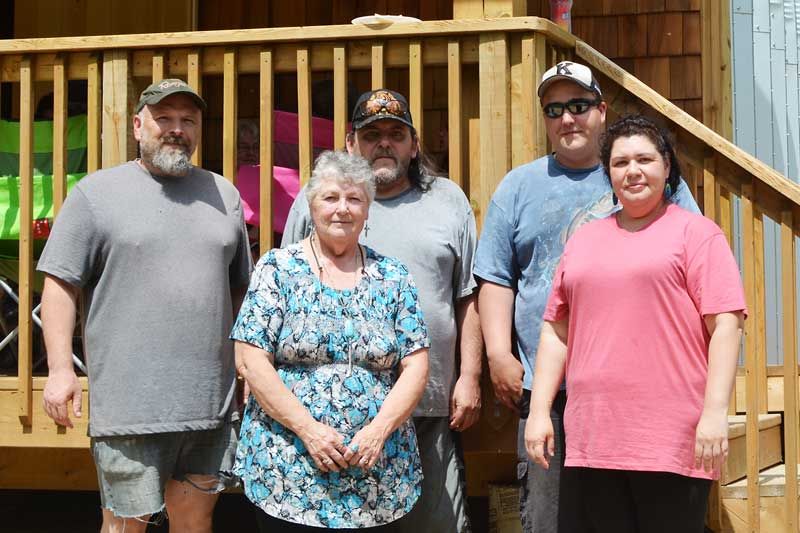Jeff Green | Jun 01, 2016
The Council of the Shabot Obaadjiwan First Nation (SOFN), along with a crowd of members of all ages, gathered last Saturday, May 27 for their annual spring fish fry. But this time, instead of renting or borrowing someone else's hall for the event, they held it in their own new cultural centre.
The SOFN have been working on the centre for a number of years and it is now ready for use. It is located on 50 acres between Highway 7 and White Lake that have been occupied by SOFN under a land use permit from the Ontario Ministry of Natural Resources and Fisheries since 2007. The wooded property is included as one of the parcels of land to be transferred to the Algonquins of Ontario as part of the Algonquin Land Claim. It is adjacent to the 500 acres that are reserved for the White Lake Fish Hatchery, and one of the clauses in the Agreement in Principle to the land claim provides for that land to be offered to the AOO if the province ever decided to cease the fish hatchery operation.
“When we went to the MNR to talk about the land for our cultural centre about 10 years ago it was because we did not want to put our own community development on hold while waiting for the claim to be completed. We wanted to build a home base for ourselves, and that is what this building and this land is all about,” said Shabot Obaadjiwan Chief Doreen Davis at the opening of the centre.
The Algonquin Land Claim process seemed set to enter a new phase as the majority of the communities involved, including the Shabot Obaadjiwan, ratified the agreement in principle for the claim earlier this year. However, the majority of voters in a referendum that was held at the only reserve in the claim territory, Pikwàkanagàn First Nation at Golden Lake, voted against the agreement.
“We have all agreed to put a hold on the next phase of the process until the Council of Pikwàkanagàn is able to provide the kind of comfort necessary for those in Pikwàkanagàn who are not ready to sign on,” said Davis.
She said that work continues on many of the details of the complex agreement in the many working groups, with the benefit of participation from members of the Pikwàkanagàn Council, but the entire land claim negotiating team is not meeting to ratify any of the working group decisions until Pikwàkanagàn is ready.
“The land claim always had and will always have bumps and delays along the way, but we are working on our own community all the time,” said Davis.
The Shabot Obaadjiwan raise money through sales at smoke shops that they run in Sharbot Lake and Parham.
“We put everything we raise back into the community, and since our members are integrated into the broader community in the area, we are involved as well,” she said.
Shabot Obaadjiwan donates $1,000 each year to the snowsuit fund at Northern Frontenac Community Services (NFCS). This year, they have been working with NFCS on a snowshoe initiative and are looking forward to working on trail development on private land and some of the land earmarked for park use in the land claim. They also support minor baseball.
“We are working hard developing our cultural centre as well,” said Davis.
In addition to a new pre-fab building, insulation has been installed as well as a wood floor. A front porch has been constructed, as well as a privy.
The next stages are putting in a septic system and plumbing for the centre.
A hand-made birch bark canoe that Shabot Obaadjiwan members built a few years ago is going to be installed inside the front door of the center sometime soon, and other decorations are planned.
“This will be a location where we can live our ceremonial life, our funerals, our weddings, our celebrations,” said Davis, “but we are not trying to exclude anyone either. We will make it available for community use as well.”
The site itself is also under development, as it is transformed from deep bush to a location that can host community ceremonies. Perhaps in time it will host an Algonquin nation gathering, similar to one that was hosted at the Sharbot Lake beach three years ago.
“It takes time, and it takes funds and volunteer labour to do all these things, and we can only do things as we can afford them,” she said.
More Stories
- Harrowsmith Public School and the Magic of Theatre
- You’re a Good Man Charlie Brown – a school wide effort at SHS
- Leadership From Within
- New Bulk Water Station in Sydenham
- Frontenac County Council looks at Healthcare Recruitment
- Good Turn Out Maple Fest Despite Rain
- Future looking brighter for Denbigh Fire Department says Chief
- Local Favourites featured at 2nd Annual SF Music Festival
- Perth Festival of the Maples, Saturday, April 27
- South Frontenac Council

